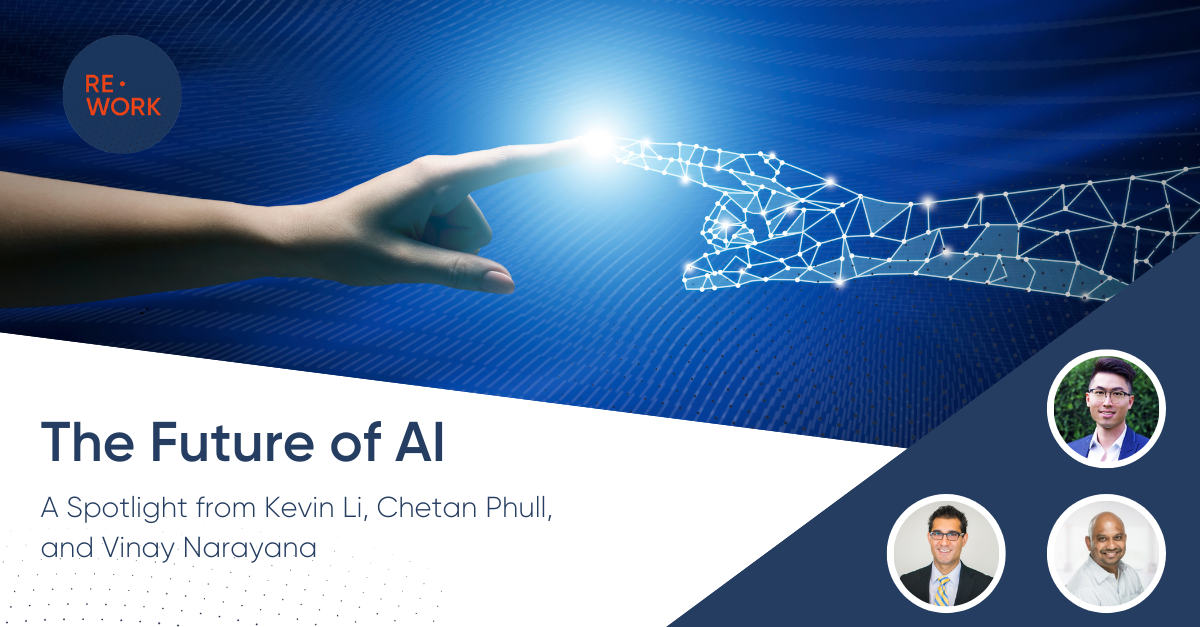The future of AI is set out to improve the quality of our lives to a great extent, but it also comes with it's own challenges. Ahead of the RE•WORK - Toronto AI Summit, we asked Kevin Li, Machine Learning Engineer at Princess Margaret Cancer Centre, Chetan Phull, Associate | Data Privacy, Cybersecurity, and Digital Law at Deloitte Legal, and Vinay Narayana, Sr. Director of AI/ML Engineering at Levi Strauss & Co. their thoughts on the topic. Here's what they had to say:
What do you think are the most important advancements for Deep Learning?
"It is hard to say what the most important advancements for DL are. But I think four areas of DL research have made significant progress over the past few years. A) interpretable neural network B) transformers architecture used in vision and language tasks C) diffusion models on image synthesis D) vision-and-language pre-training in a large-scale context." - Kevin Li
"Integration of automatic trading algorithms designed to balance customer vs public interests, so as to maximize returns without triggering market-crashing selloffs." - Chetan Phull
What are some recent wins from an AI project you are working on? What challenges did you face during it? How did you overcome them?
"One of the recent wins from our AI project is that we successfully build algorithms to understand and model cognitive intelligence from brain images. The knowledge we learned from the research also helped us to build state-of-the-art NLP models for topics clustering.
During the research, one of the biggest challenges we face is that we do not know how confident we should be in using learned latent parameters in concluding our results. We use a Bayesian variational inference method to model explicit parametric approximation to overcome that. It allows the models to learn through 600 billion parameters (derived from different brain compartments) and provides us with the variance of the latent distribution. Eventually, the results help us conclude which brain compartments are most associated with cognitive development." - Kevin Li
"Deloitte Legal has been consulted as subject matter experts on a variety of AI initiatives in government and private industry, none of which we are liberty to disclose at this time." - Chetan Phull
"Led a team that built and delivered a Google cloud native AI platform that enabled us to reduce the deployment of our real-time models in production from several months to 4 weeks. Of the many challenges we had, the most important are below:
- Access to reliable data for our models
- Using a not-so-mature cloud-native platform
- Finding resources to build this platform while keeping our headcount and also not missing out on any already committed plans
Solving the data problem will take a long time but we made strides in treating data as a product and built various architectural patterns to support our use cases. For the cloud-native platform, working closely with our awesome Google account and their engineering team allowed us to overcome technical challenges by using Vertex AI. We also wrote software to close any gaps in Vertex AI. Lastly, we instituted inner sourcing for all the abstractions we built using Vertex AI. This enabled us to make very fast progress by leveraging the free cycles available from other like-minded teams." - Vinay Narayana

How engrained will AI be in the Finance space or Deep Learning in your industry 5 to 10 years from now? What will some future trends be then?
"Automated decisions for approval of loan/insurance applications are anticipated to be a normal aspect of AI in Finance within the next few years. The required appeal process, and any use of synthetic data to correct bias, will present ongoing legal concerns that will need to be managed." - Chetan Phull
"AI has applications across all industries and companies in traditional manufacturing, fashion, etc. have started building up their AI teams. I expect this to continue and in fact, accelerate over the next 5-10 years where every IT or tech organization in the world will have data scientists and ML engineers on their payroll. Additionally, I expect in the next 10 years or so, the cloud-native AutoML capabilities and other cloud-native AI services such as demand forecasting or recommendation services, etc. will be so advanced that an average DevOps engineer can start delivering immediate value to their companies. This will help with lowering the ever-growing demand for the data scientists in the next 10+ years." - Vinay Narayana
What are you most looking forward to while speaking at the AI Toronto Summit?
"Looking forward to a fabulous conference and having inspiring conversations with people from different experiences." - Kevin Li
"Meeting potential clients aware of—or eager to learn about—the legal risks associated with high-impact algorithms." - Chetan Phull
"I am most looking forward to meeting and socializing with people from various industries at the conference. I am also looking forward to attending and bringing back learnings from the other sessions." - Vinay Narayana
Want to learn more?
Kevin, Chetan, and Vinay will all be speaking at the upcoming Toronto AI Summit on November 9-10, 2022, in Toronto, ON, at the Westin Harbour Castle Hotel. Join them and many other AI/ML and Deep Learning experts to learn more about the latest trends and opportunities in the industry.
Early Bird Passes end on Friday, September 30, so book your place today.
For more information, contact [email protected].
